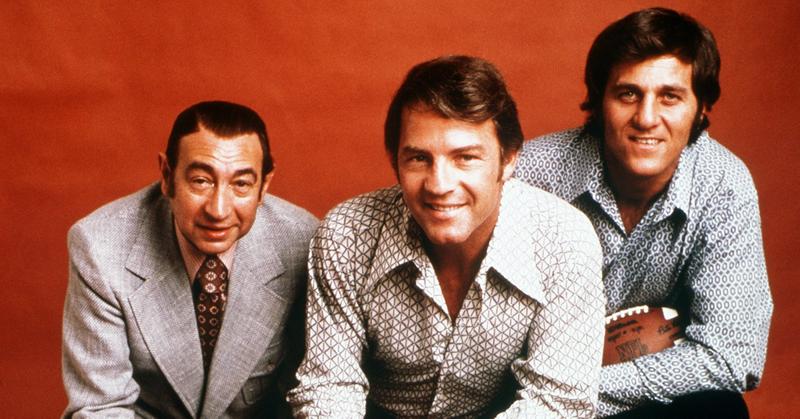Monday Night Football: 50 Years Of Facts And Trivia
By | September 19, 2020

On September 21, 1970, ABC's Monday Night Football aired for the first time, bringing NFL fans something they'd never seen before: football... on a Monday night. Howard Cosell, Don Meredith and Keith Jackson called the game between the New York Jets and Cleveland Browns. The broadcast became a tremendously popular American sports institution, one more game to give fans a reason to make it through the Monday workday.
The Jets' Joe Namath threw three interceptions that night, and the Browns won 31-21.

Prior to 1970, Sundays were an all-day watch party for pro football fans -- but only on Sunday. Commissioner Pete Rozelle had wanted to branch out from Sundays for years but found resistance from television networks. The original plan was for Friday nights but, of course, that’s long been the slot for Friday Night Lights and high school football. Eventually, Rozelle sold ABC on Monday night and the National Football League would never be the same.
A Roaring Success

ABC’s deal with the NFL was $8.5 million for the first season. Adjusted for inflation, that shrewd deal would cost $56,940,798.97 today. Instead, thanks to Americans' insatiable appetite for football, ESPN renewed their deal in 2011 at $15.2 billion for 8 years of Monday Night Football. That comes out to $1.9 billion annually, not bad, huh? That first Monday night drew 85,703 spectators and attracted a whopping 33% of the viewing audience. However, ABC executive Roone Arledge didn’t just sit on his laurels; the keen executive made changes to the broadcast that would forever alter the NFL broadcasts moving forward.
A Prescient View Of NFL Broadcasts

To set the Monday Night Football broadcasts apart, Arledge doubled the number of cameras. That offered viewers previously unprecedented angles of all the action. MNF producers also extensively used replay, which had never been used to such a degree. Arledge also added another broadcaster to the booth and made sure his first game featured an all-star line-up.
The first announcers of MNF were Keith Jackson, former Cowboys quarterback Don Meredith, and Howard Cosell. Arledge settled on Jackson, remembered today as the voice of college football, after he passed on Frank Gifford, Curt Gowdy, and Vin Scully. Gifford would end up replacing Jackson in the second season of Monday Night Football.
Cosell, as only he could, painted the picture describing the evening as a “Hot, sultry, almost windless, night.”
'Monday Night Football' Set the Standard For A Premium Sports Broadcast

Today, with more 24/7 sports networks than games, the idea of a highlight show is almost antiquated. However, in 1970, the concept of Howard Cosell doing highlights from Sunday's action during halftime was mind-blowing. Nine years after Cosell rattled off the highlights, a little company in Bristol, Connecticut called ESPN was started. It’s not a stretch to say those two events were linked. Ironically, ABC bought a controlling interest in ESPN in 1996.
Amazingly, Rozelle had to shop MNF football around. CBS and NBC passed, skeptical that football during the week could compete with their lineup of the The Doris Day Show and Laugh-In. Even ABC, then the lowest-rated network, initially said no. It wasn’t until Rozelle secured an offer from the Hughes Sports Network, subsidized by the billionaire Howard Hughes, did ABC relent.
Over The Years

With 50 years of history nearly in the books, MNF has provided some unforgettable moments on the field and off. In 1974, during halftime, Howard Cosell broke the news of John Lennon’s murder. In ‘75 Meredith referred to Richard Nixon as “Tricky Dick,” helping hasten his exit from the broadcast booth. O.J Simpson even took a turn announcing games after Cosell wore out his welcome.
Some of the most memorable games included the ‘85 Chicago Bears falling to Miami Dolphins, ensuring that the ‘72 Dolphins would remain the only undefeated team in NFL history. That game drew a massive rating, taking in 46% of the audience. Another MNF memory not soon to be forgotten was Brett Farve’s surreal performance against the Raiders in 2003, the day after his father passed from a heart attack.
